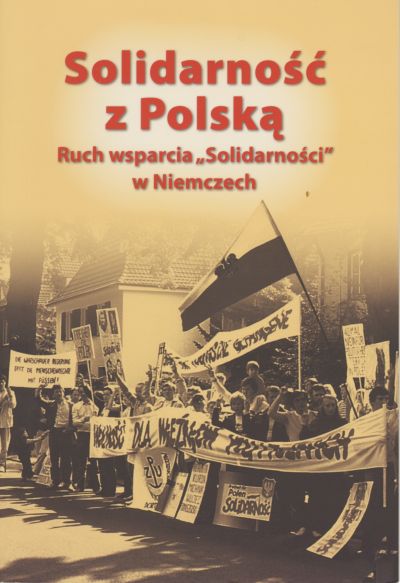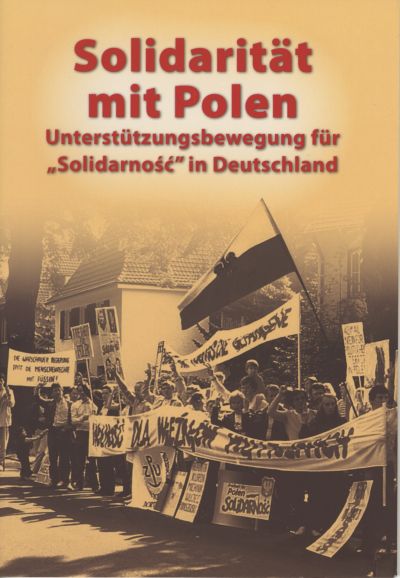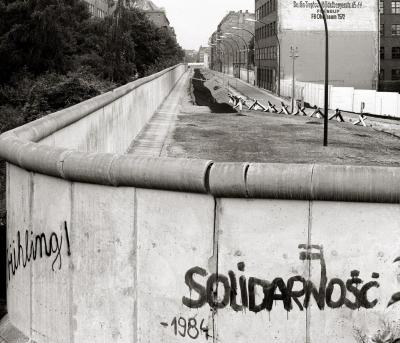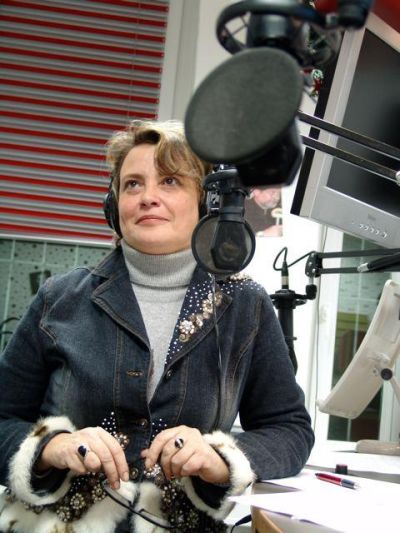The pro-Solidarność movement in Germany

The martial law imposed by the Communist regime in Poland on 13 December 1981 triggered a strong citizens’ movement throughout the world, which manifested itself in many supporter groups for Solidarność, which was working underground. Their first coordination meeting was held on 13 and 14 March 1982 in Düsseldorf and was attended by representatives of Solidarność who were in the Federal Republic at that time. At the meeting, the “Solidarność” working groups (SWG) decided to set up an Information and Coordination Office for Solidarność in Bremen, whose role it was to coordinate the activities of the pro-Solidarność movement in the Federal Republic and in West Berlin and to provide information about them. The office was involved in all initiatives of Solidarność in exile and maintained contacts with the trade unions of the DGB and with the SPD and CDU/CSU parties. From 1983, the office published a bulletin that appeared regularly in German. However, when board members Marek Mikołajczyk, Henryk Jagielski, Adam Dembowski and Bogdan Felski willingly declared their resignation in the Polish Embassy on 21 and 22 September 1983, the DGB stopped its financial support, as a result of which the Mayor of Bremen gave notice on the office premises.
The “Solidarność” Mainz e. V. aid committee, which had been founded in 1982 by husband and wife Jolanta and Andrzej Wirga to pursue the registration of persecuted Solidarność activists, then took over the roles of the central office in Bremen, and particularly the coordination of the actions taken by the Solidarność supporter organisations in the Federal Republic and in West Berlin. In 1983, the card index contained more than 8,000 names of people who were persecuted, under arrest or had been let go from work, over 1,400 of which were supported within the framework of a “patronage campaign”. The Committee also published the German-language version of the “Information Bulletin of the NSZZ Solidarność Trade Union”, which was issued in Paris. It then later distributed its own bulletin in which reprints of articles from the Polish underground press could be read. This newsletter was addressed to the delegates of the German Federal Parliament, the political groups in parliament and leading German politicians. Andrzej Wirga represented Solidarność Walcząca (Crusading Solidarity) in the Federal Republic and was responsible, in the Conference of Solidarity Support Organisations (CSSO) to which his aid organisation belonged, for bringing technical equipment to Poland for the underground trade union. Other than that, he was also involved in organising demonstrations and protests. He also gave a lot of interviews to the press, the radio stations and German TV companies within the context of the committee’s large-scale communication campaign, and he provided the Polish service of the Radio Freies Europa station with information. On top of this, he arranged meetings with German politicians and trade unionists. In 1985, a photo exhibition, which he had curated, was held at the DGB headquarters in Frankfurt am Main. To mark the fifth anniversary of the Solidarność Walcząca, pictures from the independent photo agency “DEMENTI” were exhibited in the Konrad Adenauer House in Bonn. The exhibition was opened by the Minister for Employment at the time Norbert Blüm.
The “Solidarność” West-Berlin working group was created in December 1981. Its key figures included Krzysztof Wcisło, Krzysztof Kasprzyk, Barbara Nowakowska-Drozdek and Wojciech Drozdek. The association published its own monthly magazine “Przekazy” (“Messages”), whose editor in chief was Krzysztof Kasprzyk until Wojtek Drozdek took over. In 1984, the magazine was declared the voice of the “Solidarność” working groups in West Berlin, Cologne, Eschweiler – Aachen and of the "Solidarność" aid committee in Mainz. The Berlin office was officially opened in August 1982 with an exhibition to mark the two-year anniversary of the “Solidarność” trade union, with this type of event following a typical format. They showed works by Andrzej Krauz, for example, and they provided a space for artists from the GDR, both those who had left for the Federal Republic, as well as those who remained behind the “Iron Curtain”. A special edition of the magazine “Przekazy”, which was dedicated to the opposition in East Germany, was published for this exhibition. In 1984, the SWG West Berlin ceased its activities.
In 1983, the Towarzystwo “Solidarność” – “Solidarność” Association emerged from the informal Committee for the Defence of [the Trade Union] “Solidarność” (Komitet Obrony Solidarności, (KOS)) in West Berlin. The co-founder and chair of this organisation, which, just like the KOS, was predominantly there to assist Solidarność activists who had been persecuted under martial law, was Edward Klimczak. Another role of the organisation was to provide German society and Poles living in the West with information about the situation in the country. The people in the Polish underground were supported with smuggled printers, printing accessories, listening devices, radios and televisions. Books and other printed matter in very small print runs, as well as literature in Russian and Ukrainian, were also smuggled over the border. Kazimierz Michalczyk organised the transport for Solidarność Walcząca in the east of the country, whilst Leszek Kaleta supplied the Wrocław branch. The “Solidarność” society, as an arm of the CSSO, also hosted the annual meeting in West Berlin. At the beginning, the KOS published a “Biuletyn Informacyjny” (“Information Bulletin”) every two weeks, which was later followed by the magazine “Pogląd” (“Opinion”), which had been published in German every three months since 1983. From 1985, “Pogląd” was also sent to Poland in a small format.
The “Solidarność” working group Cologne was created in 1982. Because the Embassy of the People’s Republic of Poland was located in Cologne, this association played an important role in arranging the formalities relating to the frequent protests and demonstrations which it held with other organisations to support the “Solidarność” trade union. In the hands of the SWG Cologne, these events included marches through the city (13 December 1983), rallies in front of institutions of the People’s Republic of Poland (13 May 1988), hunger strikes (24 December 1981 and 6 May 1985), celebrations for memorial days (1 October 1984), fundraising activities, information stands and petitions (1 May 1982). One spectacular initiative, which happened during the week of 6 to 13 May 1985, was a hunger strike for the release of the Solidarność members Andrzej Gwiazda, Władysław Frasyniuk, Bogdan Lis and Adam Michnik, who had been sentenced to long prison terms, for the leaders of the Confederation of an Independent Poland (Konfederacja Polski Niepodległej (KPN)) with Leszek Moczulski at the helm, and against the persecution of the Catholic church and its priests. There were similar initiatives in Brussels, Paris, London, Vienna, Manchester, Oslo and Chicago. The heads of the Cologne group were Jerzy Lisiecki, Stanisław Wolnik, Krzysztof Chorosiński, Marek Poliwski, Stanisław Cegliński and Dorota Leszczyńska.
The “Solidarność” Working Group Eschweiler – Aachen first emerged in August 1982 after making contact with the Solidarność office in Bremen and the SWG West Berlin. It was mainly involved in acquiring and transporting medicine as well as humanitarian aid. As the group gained more and more sympathisers in Aachen over time, it began to operate under the name Eschweiler – Aachen. In the mid-1980s, with branches in Düren, Monheim and Bonn, it had over 150 members.
This association also provided Germans and Poles with information and organised three of the exhibitions dedicated to Solidarność. The first was held in Eschweiler town hall, the second in Aachen Municipal Library and the third, to mark the tenth anniversary of Solidarność, in the Kulturhaus Barockfabrik in Aachen. The group also handed out leaflets, was involved in editing the monthly magazine “Przekazy”, which appeared in Berlin, distributed the “Information Bulletin” and underground press from Poland, and set up information stands. From 1983, it was almost always involved in organising demonstrations in front of the Polish Embassy in Cologne and also took part in protests held by other independence organisations, like the Christian Ministry for the Liberation of the People (Chrześcijańska Służba Wyzwolenia Narodów (ChSWN)), the Association of Polish Refugees (Zjednoczenie Polskich Uchodźców (ZPU)) or the “POMOST” association (The Bridge). The SWG Eschweiler – Aachen also cooperated with other Solidarność supporter groups in West Germany, such as the “Solidarność” aid committee in Mainz, the SWG in Cologne, Munich and West Berlin and the “Solidarność” society in Berlin. In 1986, the group approached the CSSO organisations. It was admitted in 1987 on the occasion of the congress in London. Within the framework of the CSSO, the group took over the patronage of the “company” publications in Poland, among other things. In addition, in 1988 and 1990 it also organised CSSO meetings, latterly on the occasion of the tenth anniversary of the August protests in Poland. The assistance given to the democratic opposition and the underground Solidarność in Poland were coordinated on a regional basis by Ryszard Wyżga for West Pomerania, by Jerzy Szczepański for Central and Eastern Poland and by Wojciech Gawron for the foothills of the Beskydy Mountains. Aleksander Zając organised the aid for Solidarność Walcząca. Bogusław Teodorowski and Mieczysław Zarzyczny were responsible for Silesia. Wojciech Gawron und Aleksander Zając, as representatives of the Academic Information Centre (Centrum Informacji Akademickiej (CIA) of the NZS, supported the Independent Association of Students (Niezależne Zrzeszenie Studentów (NZS) in the West. Technical equipment was smuggled into Poland by Andrzej Wirga of the “Solidarność” aid committee in Mainz and by Józef Lebenbaum from the IPA (Independent Polish Agency) in Lund in Sweden. The SWG Eschweiler – Aachen supported the underground publishing houses, which were operating in Central and Eastern Poland, in West Pomerania and in the Beskydy foothills, as well as the publishing houses of the NSZ student associations in Kraków and Warsaw. Striking members of Solidarność were also given financial aid. There were cooperations with the Academic Information Centre in Warsaw and with the Solidarność Walcząca. The following media were supported: “CIA – Serwis Informacyjny NZS” (Information bulletin of the association of students), “Solidarność Podbeskidzia” (Beskydy foothills), “Z Dnia Na Dzień” (Lower Silesia), “Solidarność Walcząca”, “INDEKS” (Kraków), “BIULETYN” (Association of Students at the Business Academy in Kraków), “Na Bieżąco” in Opole, “Jedność” (West Pomerania), “Obraz” in Szczecin, Tygodnik Wojenny and the citizens’ committees in Tychy and in Bielsko-Biała.
The association Solidarity of Free Poles in Bavaria (Solidarność Wolnych Polaków w Bawarii, (SWPwB)), which was founded in 1983, came about thanks to an initiative of the employees of the Munich station Radio Freies Europa. The first managing director of the association was Janusz Urbanowicz, who had already been briefly involved with the movement for the defence of human rights and civil liberties (Ruch Obrony Praw Człowieka i Obywatela (ROPCiO)). He was succeeded by Wojciech Stockinger, who was then followed by Nina Kozłowska. The association also published a “Biuletyn Informacyjny” (Information Bulletin), from which the magazine “Polonik Monachijski” (Munich Polonicus) originated, which was led by Mirra Filipowicz, Jerzy Sonnewend and Bogdan Żurek, to name but a few. This association also belonged to the CSSO. The organisations, which carried out countless initiatives and events for Poland in Bavaria, were energetically supported by actors and artists as well as by employees of the radio station Radio Freies Europa. The following people should be mentioned at this juncture: Jacek Kaczmarski, with whom the songwriter of the “Prager Frühling”, Karel Kryl also performed, Wojciech Stockinger, Santos Liszko, Marcin Idziński and the prominent jazz musician Leszek Żądło. Thanks to her many contacts in German circles, the actor Barbara Kwiatkowska-Lass also played an important role as she got the relief efforts for Poland under way during martial law, looked after political refugees and their families, and started charity events. The association also came up with the idea of the “The right to free speech” exhibition, which, on the initiative of Nina Kozłowska, Anatol Kobyliński and Dr. Witold Pronobis among others, could be seen in the University library in Eichstätt.
The “Solidarność” Munich working group was founded in 1982 by Jerzy Jankowski, who was killed in a car accident at the beginning of the 1990s. Otherwise, we only know that Wiesława Wołek published the magazine “Słowo Solidarności” (“The voice of Solidarność”). No other documents about the group’s activities have been preserved.
More initiatives to support Solidarność were created in Germany from the mid-1980s. These included Teatr Bezdomny “Solidarność” (Homeless Theatre “Solidarność”) led by Paweł Ciesielski and the Klub “Wolni i Solidarni” (“The Free and the United” club), which was formed by Józef Piotrowski.
The organisations that worked together in the pro-Solidarność movement in Germany included: the Christian MissionChSWN, the ZPU association, the Polish Socialist party (Polska Partia Socjalistyczna, (PPS)), the socio-political association “POMOST”, the Polish Club (Klub Polski) in Hamburg, the Polish Information Club (Polski Klub Informacyjny) in Hanover, the Juliusz Mieroszewski Club for Free Political Thinking (Klub Niezależnej Myśli Politycznej im Juliana Mieroszewskiego), the editorial department of the bulletin “Nie Cenzurowano” (“Uncensored”) published by the Düsseldorf Committee “Solidarity with Solidarność”, the Hamburg editorial department of the “Biuletyn Informacyjny”, the Bonn Society “KONTYNENT” (the Continent), the Polish service of the Radio Freies Europa station, and the Congress for a Free Poland in Europe (Kongres Wolnej Polski w Europie).
The founding of the first committees and working groups to support Solidarność triggered a concerted relief operation for the trade union and the democratic opposition in Poland, which benefited those who were imprisoned and their families and was otherwise dedicated to acquiring and transporting medicines, organising protests and taking over the sponsorships for the family members of those persecuted. For example, in 1982, the SWG West Berlin was financially involved in the treatment of a child of Grzegorz Palka, a Solidarność official in Łódź, in a Berlin hospital. The group also organised demonstrations, rallies and marches against the dictatorship in Poland. In this context, it put on a political event with the KOS in January 1982 under the motto, “Solidarność lives”. Demonstrations on the second anniversary of martial law being imposed in Poland took place in Munich and in Cologne. As well as members of the supporter organisations, representatives of the Polish Information Club from Hanover and operators of the Düsseldorf magazine “Nie Cenzurowano” also took part in the rally in front of the Polish Embassy in Cologne. This initiative was also accompanied by a press conference of the SWG Cologne and of the “Solidarność” Relief Committee in Mainz. On 21 May 1984, on the initiative of the “KONTYNENT” society, the supporter organisations gathered together in front of the Soviet Embassy in Bonn to demonstrate on behalf of Andrej Sacharow. From 13 to 20 July 1984, rallies were held in front of Polish institutions in Cologne, which were organised by the SWG Cologne, the PPS party and the “POMOST” association. On 21 July 1984, there was a final demonstration in front of the Embassy of the People’s Republic of Poland in Cologne, which was supported by the representatives of the Christian mission ChSWN, the ZPU association and by members of the supporter organisations. This demonstration was held to mark the fortieth anniversary of the Communists seizing power and was aimed, on one hand, at making German society aware of the court proceedings against the four leaders of the Committee for the Defence of Workers (Komitet Obrony Robotników, (KOR)), which had begun on 13 July 1984, whilst on the other hand, the protest was directed at the virulent human rights and civil rights in Poland. On 1 November 1984, members of the SWG West Berlin, Cologne and Eschweiler – Aachen, as well as the “Solidarność” Relief Committee gathered in front of the Embassy in Cologne to agitate against the Communist regime in Poland and to express their outrage at the murder of the priest Jerzy Popiełuszko. At the time, the Chair of the Christian mission ChSWN Father Franciszek Blachnicki, presented the “spiritual testament” of the murder victim. The demonstration ended with a memorial to the 73 victims of martial law.
On 3 November 1984, a funeral procession for the murdered priest Jerzy Popiełuszko marched through the streets of Berlin. The march had been announced by the “Solidarność” Society, the International Society for Human Rights (ISHR), the Young Union and the “Work Group 13 August” . On 13 December 1984, the SWG Cologne and AGS Eschweiler – Aachen, with the “Solidarność” Society from Berlin, the “Solidarność” Relief Committee from Mainz and the ChSWN Christian mission from Cologne organised a demonstration for the reinstatement of the NSZZ “Solidarność” in Poland.
From 6 to 13 May 1985, 26 people went on hunger strike in front of the Polish Embassy in Cologne to protest against the arrest of Władysław Frasyniuk, Bogdan Lis and Adam Michnik and the opening of court proceedings against them. The SWG Cologne, the PPS party, the ChSWN and the Dortmund group of the ZPU were also responsible for this initiative. Similar initiatives were held in London, Brussels, Paris, Oslo, Vienna and Chicago.
On 3 June 1985, the “Solidarność” Society in Berlin went public with a signed petition to the German Chancellor aimed at stopping continuing credit talks with the regime of the People’s Republic of Poland. On 24 May 1986, a demonstration was held in front of the Soviet Embassy in Bonn to appeal against the politics of the USSR and the consequences of the Chernobyl nuclear disaster. It was SWG Cologne that had had the idea for this initiative, which it also organised along with the ChSWN, the ZPU and the “KONTYNENT” Society. The SWG Eschweiler – Aachen also held a demonstration in front of the Polish Embassy in Cologne on 30 August 1987 demanding that the NSZZ “Solidarność” trade union be reinstated and that trade union freedoms be granted in Poland. The SWG Eschweiler – Aachen held further protests in front of the Embassy of the People’s Republic on 13 May and on 31 August 1988. These rallies also demanded that trade union freedoms be granted in Poland and that the NSZZ “Solidarność” be reinstated.
Meanwhile, the German public were kept updated on the situation in Poland, on the repression and on the resistance of the population. In this context, between 1983 and 1988, the Christian mission ChSWN also organised six peace marches to liberate the people that were held between Carlsberg and Hambach Castle, a symbolic place for the fight for democratic and national rights. Each march was accompanied by a symposium, which dealt with the conditions in Poland. On top of this, numerous information tables were set up in West Berlin, Munich, Frankfurt am Main, Cologne, Bonn and Aachen to distribute materials about the “Solidarność” trade union. Articles on the situation in Poland could also be read in German-language publications, including the information magazine of the PPS “Die Wende”, in the magazine “Meinung” of the “Solidarność” society in West Berlin and in the “Information Bulletin” of the “Solidarność” relief committee in Mainz.
The Juliusz Mieroszewski Club for free political thinking, which was founded in Munich in 1985 and counted a lot of employees from the Polish service of the Radio Freies Europa station amongst its number giving it a lot of insider knowledge, played an important role in communicating with the German public. The club carried out numerous initiatives, held meetings, put on exhibitions and lectures and prepared press briefings on the current situation in the People’s Republic of Poland. It was headed up by the well known author Włodzimierz Odojewski together with the representatives Adam Rosenbusch, Bogdan Żurek and Franciszek Kotliński, with Alina Grabowska as Secretary. The actress Barbara Kwiatkowska-Lass was also active in this club. In 2002, activities stopped.
In 1983, 45 of the supporter organisations that had sprung up spontaneously around the world on four continents joined the international alliance of organisations supporting the “Solidarność” trade union (CSSO). Among the various actions taken by this umbrella association, two in particular stand out. Firstly, the legendary donation of a million dollars which was “coerced from the US Congress, and secondly, the creation of an aid programme for the individual operating committees of Solidarność.
The cooperation of the Solidarność foreign supporter organisations in the CSSO was extremely important to the effectiveness of the Poland aid, with the transfer of funds to Poland being one of its easiest tasks. The import of printed products that were forbidden under the Communists was much harder. A very specific type of logistics was required to organise and carry out the transport of technical goods. The people who really went the extra mile in this respect included Mirosław Chojecki in France, Józef Lebenbaum and Marian Kaleta in Seden, Andrzej Świętek in Denmark and Andrzej Chilecki and Andrzej Wirga in Germany. Their services were always called on when printing and offset machines or reproduction equipment, devices for intercepting radio traffic of the militia (Milicja Obywatelska, (MO)) and the security services, radios and special jamming equipment were needed. Each support group maintained their own contact with Poland. The recipients of the deliveries included: the international office of “Solidarność” in Brussels, the “Solidarność” NSZZ, the Provisional Coordination Commission of the “Solidarność” trade union (Tymczasowa Komisja Koordynacyjna NSZZ Solidarność), the regional sections of Solidarność in Łódź, Central and Eastern Poland, Beskydy foothills, West Pomerania, Gdansk shipyard and Silesia-Dąbrowa, the Academic Information Centre of the Independent Student Association (Centrum Informacji Akademickiej NZS), Solidarność Walcząca branches in Wrocław, Katowice, Poznań, Solidarność Walcząca, the Confederation of an Independent Poland (KPN), the “Niepodległość” (Independence) and “Wola” (Will), groups of the wing of the PPS party of Józef Pinior, the Polish Independence Party (Polska Partia Niepodległościowa), the Citizens’ Committees in Tychy and Bielsko-Biała, the Citizens’ Committee of the trade union chair Lech Wałęsa, the functionaries Andrzej Słowik, Zbigniew Romaszewski, Romuald Szeremietiew, Marian Jurczyk, Leszek Moczulski, Stefan Bratkowski and Kornel Morawiecki and editorial offices of periodicals and information newsletters, including the “CIA – Centrum Informacji Akademickiej”, as well as editorial offices of newspapers and magazines, such as “Solidarność Podbeskidzia” (Beskydy foothills ), “Z Dnia Na Dzień” (Lower Silesia), “Solidarność Walcząca”, “INDEKS” (Kraków), “BIULETYN” (Kraków University of Economics), “Na Bieżąco” (Opole), “Jedność” (West Pomerania), “Obraz” (Szczecin), “Tygodnik Wojenny” and the news review “PWA – Przegląd Wiadomości Agencyjnych”.
In 1990, on the tenth anniversary of the “Solidarność” trade union, a CSSO congress was held in Aachen, at which the representatives of the pro-Solidarność movement came together with the representatives of the National Commission of the “Solidarność” trade union (Komisja Krajowa NSZZ Solidarność) and the representatives of the parliamentarian citizens’ club (Obywatelski Klub Parlamentarny). In the same year, the last president in exile Ryszard Kaczorowski presented the new, democratically elected President of the Third Republic, Lech Wałęsa, with the insignias of the President of the Second Polish Republic. This gesture brought the mission of the Solidarność supporter organisations abroad to an end.
Alexander Zając, June 2022
Additional information:
The Polish Club (Klub Polski) in Hamburg coordinated the relief efforts on site, with other organisations that were working towards independence being actively involved in its work. These included the Association of Polish Combatants (Stowarzyszenie Polskich Kombatantów (SPK)), the Hamburg party office of the PPS, the KPN and the wing that had broken off from the trade union Solidarność 80”. The club organised meetings with members of the opposition, such as Marian Jurczyk and Romuald Szeremietiew as well as demonstrations and protest initiatives. One of the best known activities was a demonstration in front of the Consulate of the Soviet Union, which was carried out on boats because the organisers did not receive permission to approach the Consulate building from the street. The club was led for a long time by Maksymilian Pelc. His successor was Arkadiusz Kulaszewski.
Information on the Internet about:
1. The Conference of Solidarity Support Organizations (CSSO)
http://en.wikipedia.org/wiki/Conference_of_Solidarity_Support_Organizations
2. The “Solidarność” Eschweiler – Aachen working group
http://pl.wikipedia.org/wiki/Arbeitsgruppe_%22Solidarno%C5%9B%C4%87%22_Eschweiler-Aachen_e.V. und http://www.dw.de/dw/article/0,,15584318,00.html
3. The Polish service of the Radio Freies Europa station
http://pl.wikipedia.org/wiki/Radio_Wolna_Europa




